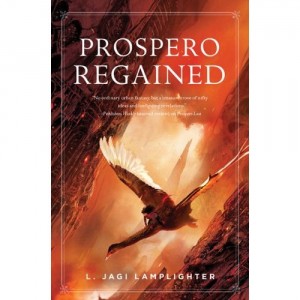When I was young and arrogant, I used to criticize authors for not handling “obvious” issues in their books—issues which, in retrospect, were usually me jumping to some conclusion that the author could never have been expected to foresee.
Well, this particular phenomena has come back to haunt me, as now similar things are happening to my readers.
One of the oddest experiences as a writer is watching the conclusions your book accidentally leads people to that you did not intend.
For instance, it never occurred to me, when I wrote the Prospero Books, that people reading Book Two would come to the conclusion that, since Miranda lost her connection to her Lady, and there is an angel and one of her brothers criticizes her for her attachment to the “pagan goddess Eurynome”, that the third book might be Christian apologetics, with the story chronicling Miranda’s conversion to Christianity.
For any of you who have not read the last book, I do not feel it is a spoiler to say: That doesn’t happen.
The question was never meant to be raised.
It never occurred to me that this issue would arise because I never thought of Miranda’s brother as representing the author’s point of view. Rather, the background universe agrees with Miranda, w ho did not see Eurynome as being in conflict with God. In the Prospero Books background, the Unicorn is a servant of the Alcreate, the same way angels are. There isn’t suppose to be a conflict between them.
Hopefully, readers who are nervous about this subject will be delighted with the way the story actually unfolds. Alas, there will be a few who wish that it would be a story of unfolding Christianity who may be disappointed. Or, maybe not, considering how it all comes out. I like to think that the idea that Eurynome and the Christian universe are not at odds with each other makes itself clear by the end.
Either way, I tried quite hard to make sure that it was not preachy, though I did try hard to make the Heavenly magic impressive and cool.
But that is not quite to the subject…which is that the author cannot control the assumptions that readers jump to.
The same thing happened last year, to my detriment, with a gentleman who read the first two books with an eye toward buying them for a publisher in France. Eventually, he commented that he did not care for books where the main character studiously ignored reality. Puzzled, I asked him what he meant—citing Miranda’s attitude toward her father, who had clearly ensorcelled her. Without resorting to spoilers, I will just say that the third book does not bear out his interpretation of the situation, thus his conclusions about Miranda and her behavior were incorrect.
Not much I can do about that…though if he ever reads the last book, maybe he will reconsider.
So…my humblest apologizes go out to all authors whom I maligned in my youth. I apologize for every believing a precept as ridiculous as that you could have been responsible for thinking ahead of time of all the outlandish theories I might concoct while reading your books.




